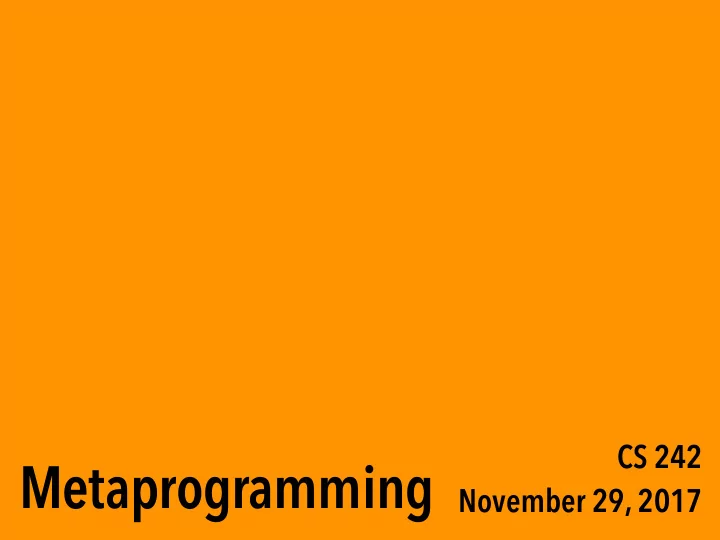

CS 242 Metaprogramming November 29, 2017
Today’s goals • Seeing the diversity of tools for generating code • Understanding the use cases for metaprogramming • Formalizing a structured taxonomy of metaprogramming
CODE is DATA
“One man’s program is another program’s data.” Olivier Danvy
C preprocessor: programs as strings • Programmatic, iterative find + replace - Composable! Macros within macros • Expressiveness: add constructs to the language - “Polymorphic” functions without void* - Foreach loops • Performance: inline everything - Don’t leave it up to the compiler • Correctness: easy to break (not hygienic ) - Variable names clash - Incorrect precedence
C++ templates: sugaring “polymorphism” • Templates provide illusion of polymorphism - Thinly veiled mechanism for static dispatch - Not type safe - Sugar is more convenient than C • Waaaay more to templates than meets the eye - Who put a Turing-complete language runtime in my compiler?
Rust: many kinds of metaprogramming • Macros: find+replace with hygiene - Principled pattern matching: expressions vs. statements - No accidental variable use (partially thanks to lexical scoping) • Custom derive: Rust code introspecting struct fields - Function : struct —> trait impl - First example of staging: running Rust code at compile time - Specifically generates trait implementation of a struct • Procedural macros: Rust code doing anything - Function : tokens —> Rust code - Highly expressive - Not composable
Staging Finite levels of evaluation
Scripting languages close the loop • Fused compiler/interpreter = runtime metaprogramming - eval/dostring/loadfile/etc. - Varying support for quotations • “Infinitely” staged (no limit on theoretical recursion) • Reflection is commonplace, but still meta programming - Getting the type of a variable - Inspecting the fields of a class - Generating new classes at runtime
Higher order functions = macros? let add_one = List .map ~f:( fun x -> x + 1) OCaml
Functions = macros? def map(f): return lambda l: [f(x) for x in l] @map def add_one(n): return n + 1 print (add_one([1, 2, 3])) # [2, 3, 4] Python
Homogenous metaprogramming Language generates code in the same language
Terra: metaprogrammable C in Lua • Research project out of Pat Hanrahan’s group at Stanford • Code generation important for perf in scripting - Generating the host language isn’t sufficient - Lower level targets are hard to generate/interoperate • Terra makes it easy to: - Generate C-ish code without using strings - Mix Lua values into C-ish - Compile and run generated C-ish code
Taxonomy of metaprogramming • Goal: generation vs. analysis • Representation: strings vs. syntax trees vs. quotes • Execution mode: staged vs. interpreted • Output: homogeneous vs. heterogeneous
Additional topics • Lisps: Common Lisp, Emacs Lisp, Racket, Clojure, Scheme - Originator of macros… in the 1960s! - Homoiconicity: the concrete syntax = the abstract syntax • Typed metaprogramming - Rust’s types are just syntactic (“this the syntax for a function”) - What about “this is function syntax that returns type int”? - Originated with MetaML, still active area of research - Lightweight Modular Staging (LMS) in Scala
Summary • Metaprogramming used for performance or expressiveness - “Abstraction without regret” — compile away general APIs for perf - Paper over missing features like closures or polymorphism - Drawback is often usability (debugging, error messages, no formalisms), hard to ensure correctness in macro definition • Macro systems generate code in a multitude of ways - C preprocessor/C++ templates/Rust macros: find+replace in templates - Rust custom derive/procedural macros: staged Rust code • Scripting languages get most metaprogramming for free - Main problem is generating/interoperating with efficient code
Recommend
More recommend